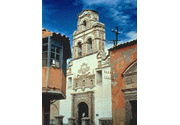Bolivia

- © UNESCO
- Potosí
Bolivia joined UNESCO on November 13, 1946. It is coordinated by UNESCO Office Quito, cluster office for Andean countries.
Bolivia is involved in the WWAP (World Water Assessment Programme), specifically
the “Cuenca del Lago Titicaca” (Titicaca Lake Basin) and the “Cuenca del Plata” case studies. The Latin American Water Forum was held in La Paz in 2005.
With three Biosphere Reserves, Bolivia participates in the Man and the Biosphere world network.
As part of the cross-cutting UNESCO project "Information and Communication Technologies for Intercultural Dialogue: Reinforcing Communication Capacities of Indigenous Communities", the project “TV Ayllu” is ongoing with the Ayllus and Markas communities.
Since June 2005, the National Library of Bolivia has been on-line with a collection of 45 of the best works in Bolivia, as part of UNESCO’s “El Dorado” Ibero-American and Caribbean Virtual Library project.
In addition to the country’s six World Heritage sites, two Bolivian masterpieces are inscribed on the list of oral and intangible heritage: the Oruro Carnival and the Andean Cosmovision of the Kallawaya culture.

